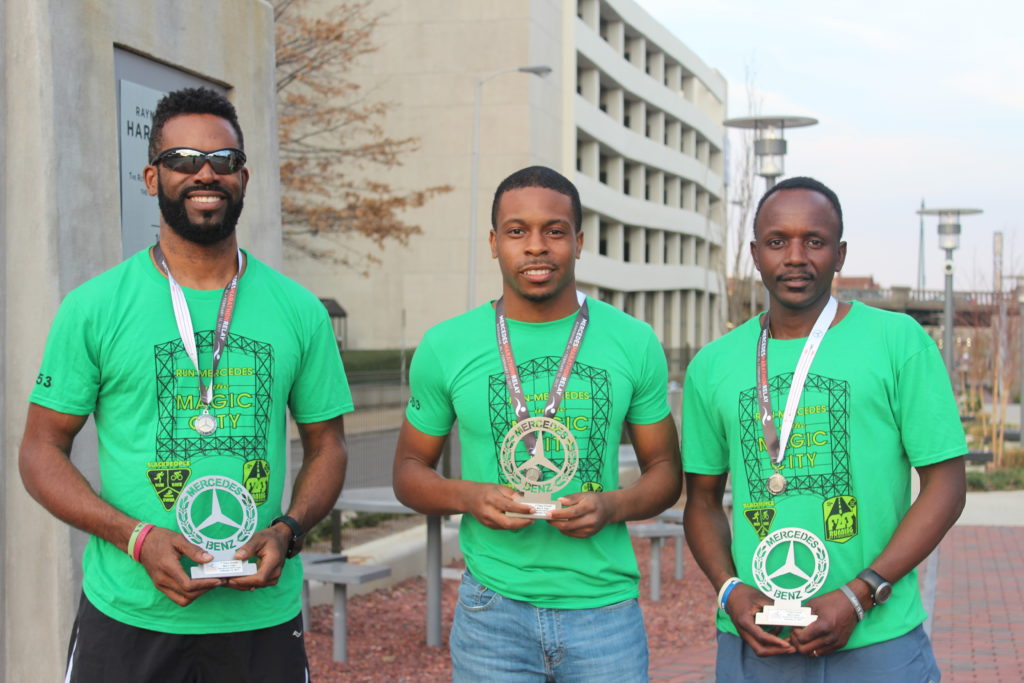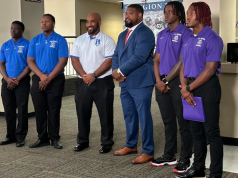
By Ariel Worthy
The Birmingham Times

Members of Fit 2 Finish Strong (F2FS), an all-black men’s relay team, are still energized from last month’s Mercedes Marathon.
The team which included Eric Thomas, 39; Gideon Waithera, 36; Dana Brown, 49; Raymond Banks, 57; and Walter McCord, 25 was the first all-black relay group to win the marathon. F2FS is part of Black People Run, Bike and Swim (BPRBS).
“We were overjoyed,” said Thomas, a running coach with F2FS. “Our goal was to just get under three hours, and we didn’t but we had a good time, and still got first place. We didn’t even realize we were number one until later that day.”
The team finished in three hours, three minutes and 21 seconds.
The team is now preparing for the Ragnar Relay Race, a 200-mile 12-person relay race held March 24 and 25. “It starts in Chattanooga and it ends in Nashville,” Thomas said. “We run straight through for about 36 hours.”
Participating in marathons breaks the stigma that black American men don’t run, said Thomas, a runner for six years.
“We do,” he said. “I see it more and more in the races I participate in. Black Americans are more known for sprinting and track and field and now we’re getting more into the long distance running.”
Waithera, who is from Kenya, said he noticed a gap in the black community between younger and older people participating in activities.
Healthy older people “are showing young people that it needs to be taken seriously and now there is an increase in younger people getting healthy. If you look at the Mercedes races … the first one I did in 2014, the numbers are different from this year,” he said.
Waithera, who ran in high school, moved to America seven years ago, and while at Lawson State Community College, one of his teachers encouraged him to start running again.
“I was slow when I started back, but joining groups like BPRBS helped me stay motivated,” he said. “When you see people doing eight-mile runs in the morning it makes you want to do better.”
When it comes to running, McCord said he has seen young blacks “on Facebook and Instagram . . . and they’re starting to be more active,” he said.
Thomas said the team looks for ways to encourage other runners.
“Some people run on their own, but we’re trying to break the stigma of runners not being friendly and welcoming,” Thomas said. “We try to be approachable, especially to beginners.”
That means getting to know other runners on the course.
“Running is a social type of activity. You can do it alone, but you can be social too,” he said. “It’s something that needs a lot of encouragement, and we have to give that. I think it also shows that black people are approachable and encouraging in these things.”
McCord met Thomas at a race.
“I used to run alone, and I met Eric a couple of years ago and he encouraged me to run with a group. Although I was on a track team in high school, it was out of my comfort zone but I did it and I really enjoy running with people now.”
Waithera said a lot of people ask how they find time to run so often. It’s all about discipline, he said.
“We all have the same amount of time in a day, and you make time for what you care about,” he said. “Time is never there, it is created, and if you are serious about running, you must create the time for it.”




